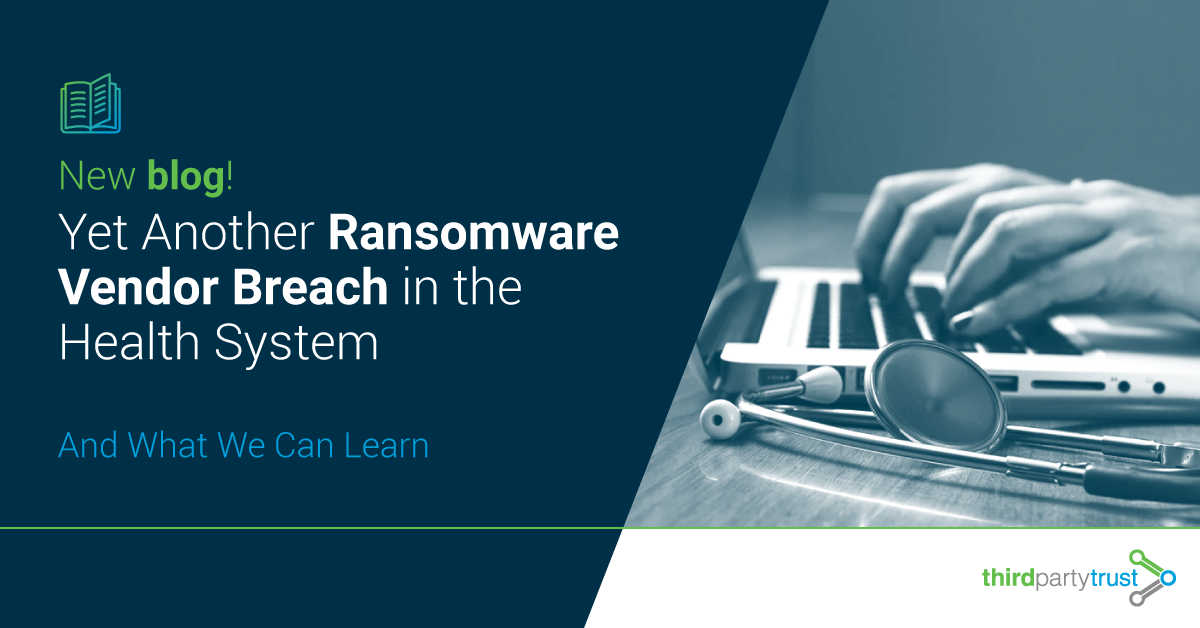Yet Another Ransomware Vendor Breach in the Health System – And What We Can Learn
A couple of weeks ago, NorthShore University HealthSystem and Northwestern Memorial HealthCare disclosed that their data management vendor had been subject to a ransomware attack earlier this year. Although the servers of their third-party contractor Blackbaud were affected, it is NorthShore that was required to notify the tens of thousands affected, including 56,000 donors to the organization. Today we’ll dive into third-party risk management and liability.
There has always been a push to shift liability to other parties in the value chain, especially when a vendor is involved. Regardless of any security measures or cyber-insurance a corporation may have implemented, corporate board members and officers are usually held accountable for what they did not do to mitigate the harm caused by data breaches.
While it’s true that third-parties need to make a bigger effort to protect the organizations that decided to trust them, the enterprises that rely on them also need to be more aware of who they’re choosing to work with. Third-party risk assessments are not a formality, but a necessity to be able to understand who will deal with the data and how.
The goal of third-party risk management (TPRM) is to ensure vendors have the proper measures, assessments and checks in place. You might want to know which of your third-parties was breached in the last year, which ones are complying with industry standards, or which ones have the strongest privacy policies. Ultimately, when having all this data at your fingertips, the question is: Is this something you can accept, or is it a deal breaker?
Although NorthShore is unlikely to be blamed for trusting Blackbaud with the data of their donors and patients, they are still ultimately and legally responsible for safeguarding this data. Even if outsourced to a third-party, the organization is still responsible for restricting access and use of the data entrusted to them. It can seem hard to do, but it’s not when you can automate the tasks and streamline the process.
What about liability?
In a recent blog discussing liability and compliance in TPRM, we saw how regulators have been advocating for (and winning) the ability to hold individual officers and board members accountable for avoidable breaches and cyber incidents.
Data privacy laws may vary across countries or industries, but in terms of liability, the organization is responsible for the private data it owns. Therefore, it’s responsible for any violation of its security, whether it is via a third-party or not.
Third-party risk should not be delegated solely to business owners, contract administrators, IT managers or sales associates. These resources should work in collaboration with the security and compliance teams to ensure proper oversight and monitoring of third-party risk.
This area has become especially important, because it is virtually impossible to conduct any type of business without relying on third-party cloud services, potentially exposing corporate networks and facilities to intrusion through electronic means.
Laws everywhere are changing in reference to breach disclosure, with the precedent of GDPR and CCPA. Organizations usually only want to disclose what they need and when, which may derive in insufficient reporting of breaches. However, many new disclosure laws now require customers to be notified if the data might have been at risk (even without forensic certification).
If all of this sounds stressing, don’t panic. Technology is here to help!
To learn more about how ThirdPartyTrust can help you streamline your TPRM program, request your free trial now:




